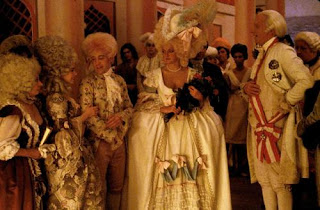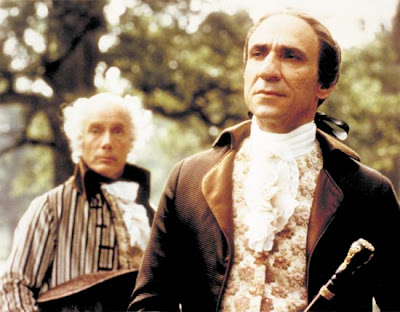A Potpourri of Vestiges Review
It
is the year 1823 and in Vienna the aging classical composer Antonio Salieri having reached the
fag end of his once resplendent life tries to end it by slitting his throat.
For the last three decades, Salieri has lived under the notion of having been personally responsible for the death of the musical genius and his greatest adversary Wolfgang Amadeus Mozart, but the burden now seems too overwhelming to bear. After
the failed suicide attempt, Salieri is shifted to a mental asylum where he is
visited by a young priest who seeks his confession. A disinterested looking
Salieri inquires the priest about his understanding of music. On learning that
the young priest had studied music at school, Salieri plays him a couple of
tunes on his piano asking him to identify them, but the priest fails to
recognize them. Salieri then plays a third tune which the priest instantly
recognizes. When the priest offers his apology to Salieri for his inability to
identify him as its original composer, Salieri, driven by his chagrin, bursts
into a fit of rage. Salieri tells him that while the first two were his own compositions the third piece was composed by none other
than Wolfgang Amadeus Mozart.
Salieri
mourns the fact that despite being the pre-eminent composer of his time, his
once celebrated works are now knocking at the doors of oblivion while Mozart’s
are on the verge of attaining apotheosis. A highly emotional Salieri then
begins to narrate his life’s tale to the priest, describing his childhood
fancies, his rise to eminence as a composer in Vienna , and the complex relationship he shared with
Mozart. These past events are presented in the movie in form of sumptuous, breathtaking flashbacks. Salieri begins by confessing that right from a very young age he had been in awe of the child prodigy named Wolfgang Amadeus Mozart having learnt about Mozart's remarkable feats as a musician. Having idolized Mozart and his divine music for years, Salieri finally
gets the opportunity to meet the musical genius in the year 1781. To his dismay, Salieri discovers that Mozart is completely different from what he had imagined him to be all his life: an imbecile incapable of understanding the nuances and subtleties of
music, a vulgar creature unworthy of his divine musical talent, an immaculate manifestation of God’s voice on Earth, an artistic genius
capable of conjuring up music that can seamlessly establish a connect with the
divine—a rare gift that Salieri could only dream of possessing.
Overwhelmed with envy, Salieri starts to look upon Mozart as an instrument of God’s
retribution against him, an unjust reward for his years of piety, virtue and prayers. Every time Salieri sees Mozart, he is inexplicably
reminded of his own mediocrity, his own inability to speak to the God. But, what agonizes him the most is that while God didn't bother to answer his prayers by bestowing him with the same musical talent, He did gift him with the cognizance to acknowledge Mozart's. Infuriated and disgusted, Salieri takes it
upon himself to destroy Mozart as a gesture of his disapproval against God’s
will. While Salieri continues to detest Mozart, his veneration for Mozart’s
sublime art only grows with time. While openly pretending to be a great friend and admirer of Mozart, Salieri uses his cunning and treachery to
malign Mozart to an extent that he gradually falls out of the Emperor’s favor. Salieri leverages upon his
resourcefulness to make Mozart lose his pupils—the only viable source of
income for a composer in those days—while simultaneously orchestrating the
decommissioning of several of his operas on the pretext of profanity, thus ruining him utterly; and yet Salieri himself doesn’t miss a single opportunity to see Mozart perform in front of the public. There are so many plot intricacies that can be discussed and one can go on and on with it, but I would rather let the movie fill in the rest of the details.
Salieri’s contrasting behavior towards Mozart vis-à-vis Mozart's music only alludes
to the presence of a deep yearning that may not necessarily be devoid of sexual
impulses. Despite all this it's rather difficult to hate or despise Salieri, for he is present in one and all in form of the omnipresent mediocrity. We as audience tend to empathize with Salieri's mediocre existence as it not only makes us understand greatness, but also the lack of it. Amadeus serves as a great overture to Mozart's oeuvre by bringing to the celluloid some of his most famous operas including The Marriage of Figaro, The Magic Flute, and The Requiem Mass in D minor, while simultaneously managing to revive all but forgotten Antonio Salieri's body of work. F. Murray Abraham as Antonio Salieri, in an Oscar-winning performance, glorifies the mediocrity associated with human existence. Abraham goes through an entire gamut of emotions, effortlessly living and breathing as Salieri, with great conviction and sheer elegance. He is offered great support by Tom Hulce who is equally impressive in his portrayal of Wolfgang Amadeus Mozart. Hulce’s simplistic caricature takes a departure from the earlier larger-than-life depictions of Mozart.
Overall,
Amadeus is a consummate cinematic experience perfected by a blend of some very fine acting,
meticulous direction, splendid cinematography, exemplary art and costume
design, and stimulating music that forms the very basis of the movie. Music, on those rare occasions when the composer succeeds in striking all the right chords, can make mortals dance to its tunes. And that's precisely what Amadeus achieves! Another facet of the movie that just can’t be overlooked is Milos
Forman’s exquisite mise en scene that literally helps bring the characters and
the period to life. The beauty of Amadeus is that it can be enjoyed at
different levels depending purely on the viewer’s willingness and ability to
indulge. For the less keen viewers, Amadeus serves to be an enthralling tale of
intrigue and obsession while the music enthusiasts look upon it as a
groundbreaking musical masterpiece. Aficionados look to explore its different
themes and layers as a means to enhance and refine their understanding of
cinema. All this makes its viewing essential for each and every cineaste. A must watch!
 | |
|
Our Rating: 10.0
IMDb Ratings: 8.4
Genre: Biography | Drama | Music
Cast: F. Murray Abraham, Tom Hulce, Elizabeth Berridge
Country: USA
Language: English | Italian | Latin | German
Runtime: 160 minutes
Color: Color (Technicolor)
Amadeus
is a 1984 Oscar-winning period drama cum musical directed by Czech American
filmmaker Milos Forman. Written by Peter Shaffer, Amadeus is an adaptation of a
1976 stage play of the same name by Shaffer himself. Shaffer’s play is a
variation of the celebrated Russian author Alexander Pushkin’s 1831 play Mozart
and Salieri. Amadeus presents a highly fictionalized account of the rivalry
between Antonio Salieri and Wolfgang Amadeus Mozart—two of the most influential
composers of the Classical period in Western music. Amadeus stars F. Murray
Abraham as Salieri, Tom Hulce as Mozart, and Elizabeth Berridge as Mozart’s
wife Constanze. Amadeus—winner of 40 awards, including eight Oscars, four BAFTA
and four Golden Globes—continues to enjoy a cult status having influenced
writers and musicians from all across the globe for well over two decades.
 |
| F. Murray Abraham as Antonio Salieri in Amadeus |
 |
| Tom Hulce as Wolfgang Amadeus Mozart in Amadeus |
 |
| Elizabeth Berridge as Mozart’s young wife Constanze |
 |
| A Still from Amadeus |
 |
| Tom Hulce as Mozart and F. Murray Abraham as Salieri in Amadeus |
Note: This post is a part of Oscar Blogathon being conducted at Once upon a screen.... Amadeus swept the 1985 Oscars, winning in as many as 8 categories including the ones for Best Picture, Best Director and Best Director.
Readers, please feel free to share your opinion by leaving your comments. As always your feedback is highly appreciated!
For more information on the title, please click on the following links:
For more information on the title, please click on the following links:
Amadeus (1984) Trailer
People who liked this also liked...








Looks like I've missed out one great movie...Thanks for the info. :)
ReplyDeleteThe pleasure is all mine :-)
ReplyDeleteThis is such a great movie, and I really enjoyed your review. Time to see it again!
ReplyDeleteI am glad that you liked the review. Yesterday, while compiling my review, I too was overcome by an urge to watch it again and thankfully I did :-)
ReplyDeleteResp.Shri Murtuzaji,
ReplyDeleteVery Nice Site..!
Thank you so very much :-)
ReplyDeleteWatched it...one of the best musicals I've ever seen. Thanks for it. :) :)
ReplyDeleteIt indeed is! Btw, I am really glad that you have already watched it :-)
ReplyDeleteNow that I've seen them, I think I will always prefer his simpler more intimate Czech New Wave films, but I still love this and consider it to be one of the best biopics ever made.
ReplyDeleteUnfortunately, I am yet to explore them... Thanks a lot for bringing it up :-)
ReplyDeleteYour rave review of a very special film brought back fond memories. In my youth I worked for Saul Zaentz's company and was lucky enough to attend the invitation-only premiere of "Amadeus" in San Francisco. Quite an experience! The movie, of course, was stunning (as you describe so well), and the after-party was "opulent" in keeping with the period of the film - the food, drink, music, etc. Only one of those prominently associated with "Amadeus" wasn't partying hard - F. Murray Abraham, who was keeping to himself in a quiet corner. Since his turn as Salieri had dazzled me, I went over and congratulated him on his performance and told him how much I'd enjoyed it. He was very gracious and humble. I was thrilled when he won the Oscar. - which he so deserved.
ReplyDeleteI think I missed replying to this one... please accept my sincerest apologies... and thanks a lot for sharing your wonderful experience here. Also, I am really glad that you liked the review!!! :-)
ReplyDelete